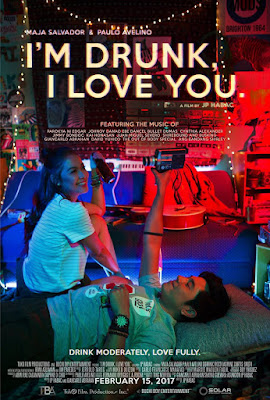CINEMALAYA 2012: POSAS (Lawrence Fajardo, 2012)
Lawrence Fajardo can become a well-established action director. His debut feature film, AMOK proved he can handle intense action scenes without compromising logic. With POSAS, although the chase scene during the first half can be the only kinetic visual element per se, Fajardo makes do with the remainder of the film with his gut-wrenching and tightly-edited storytelling- thanks also to Zig Dulay's satirical script.
Yes, POSAS falls short of AMOK in terms of intensity (the final shootout scene, the proverbial "amok" in AMOK alone catapults the film into classic status) and the comparison cannot be helped, since both are urban tales of squalor, crime, and punishment. But what saves POSAS from being an unwanted sibling to AMOK is the familiarity of the story, especially to those who are no stranger to cops using criminals for profit.
The title alone is an ingenuity. The irony is crystal clear. Petty thief Jestoni Biag (a chilling peformance by Nico Antonio) loses his freedom the very minute he seemed to have recovered it. Truly, a life of crime begets crime, and in the urban Manila landscape, right and wrong are vaguely defined. The presence of dirty cops is common knowledge.
But what maybe shocking to some is that cops do use criminals for various agenda, maybe as assets, maybe as collectors for dirty money, or as assassins. In this case, Jestoni is eyed as a dog who is expected to obey his master.
That master is the chief of Investigation of Precinct 3 (a solid and award-worthy turn by Art Acuna). He subjects the criminal into torture, coerces him, forces a confession, twists the justice system, and deceives the complainant with the ills of bureaucracy so he and his boys can benefit from the fruits of ignorance of common people like Grace (Bangs Garcia), who falls prey to an unforgiving system of corruption and half-truths.
Admirable is Zig Dulay's choice of such a petty crime of cellphone fencing in order to mirror the irony of crime and punishment, eventually forcing us into a question of should a crime be let go just because it is small, in reference to major offenses such as murder, or plunder? Somewhere, somehow, former CJ Corona will be rolling over in his seat.
Fajardo maximizes use of visual narration to tell us through words on the wall, on a police mobile, or a glass door the message he wants to convey. As many other people who have seen POSAS commented, the strategy is quite Brillante Mendoza-ish. Maybe.
For me, POSAS' strongest point is the final scene where Bangs Garcia leaves the police station, and Acuna shakes her hand and says salamat sa inyong kooperasyon (thanks for your cooperation, something like that- the original Filipino line may not be exact). Make of that what you will, but in my reading it is Fajardo's way of subliminally telling us the unconscious submission of us, citizens to authority, disregarding what is morally right simply because doing so is easier.
POSAS could have still done more, though with the material. I would have loved to see even a little human side to the police, the reasons for doing what they do, and what drives their greed. I wouldn't fault Dulay and Fajardo if they wanted the film to be tight, focusing on this incident of theft heavily, but the film as is feels suspended. I'm not saying the ending shouldn't have been open-ended, but in between the premise and the conclusion, there could have been a lot more stories to be explored, like the personal issues of the policemen, or the larger picture of shortage- shortage of funds, shortage of checks and balances, and shortage of transparency.
RATING: 4/5 (Elevating my previous grade of 3/5 at Cinephiles, upon careful analysis)


Comments
Post a Comment